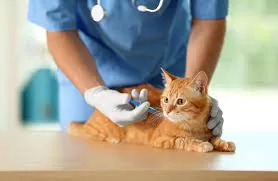Introduction to Cat Vaccination
Have you ever wondered how important the vaccine is for the health of your cats? The vaccine is not just an injection, it is a protective shield that helps prevent disease. Major feline vaccines are as essential as the air we breathe.
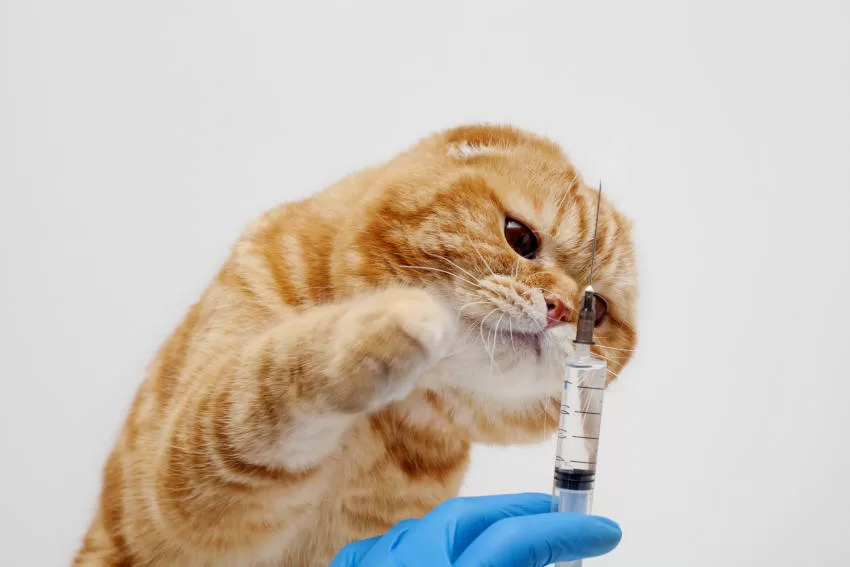
Through the vaccine, animals gain a reinforcement in the immune system against various diseases. Think of the vaccine as training your cat’s body defenses. It’s like a simulation of a disease, but without causing any real harm to the animal.
So, when the real virus tries to attack, the cat’s body is already prepared and knows exactly how to fight this threat. This clearly demonstrates the direct relationship between vaccination and disease prevention in animals. Now you understand why we say that the vaccine is an avoided disease!
Essentials: First and Second Dose of the Feline Triple
The triple feline, also known as the trivalent vaccine, is one of the main vaccines your cat needs to stay healthy . But why is it so essential?
It protects against three serious diseases: rhinotracheitis, calicivirus and panleukopenia. They are highly contagious diseases among cats and can be fatal , especially in kittens or animals with weakened immune systems.
Ideal Interval Between Doses
After the first dose of the feline triple, an interval of about three to four weeks will be necessary for the second dose. This period is crucial to ensure that your cat’s body has enough time to develop an adequate immune response to vaccines.
If you have a newborn kitten, the first dose is usually given from two months of age. However, if you have adopted an adult cat that has never been vaccinated before, it can be vaccinated at any time.
Diseases Prevented by the Triple Feline
The diseases prevented by the triple feline are:
- Rhinotracheitis: Causes respiratory symptoms similar to those of a human cold.
- Calicivirosis: in addition to respiratory symptoms, it can also cause mouth ulcers.
- Panleukopenia: Known as “feline parvovirus,” it causes severe vomiting and bloody diarrhea.
While there are other serious diseases in cats – such as Feline Infectious Peritonitis (FIP), Feline Leukemia (FeLV) and Feline Immunodeficiency (FIV) – these are not covered by the Feline Triplet. There are other specific vaccines for these diseases.
Also, if you plan to travel abroad with your cat or live in a region where there are many cases of animal rabies, you should also consider vaccinating against this disease.
Always remember that taking care of your pet’s health doesn’t just mean taking him to the vet when he’s already sick. Prevention is the best way and vaccines play a crucial role in this! So don’t neglect the necessary doses of the feline triple – they can save your kitty’s life!
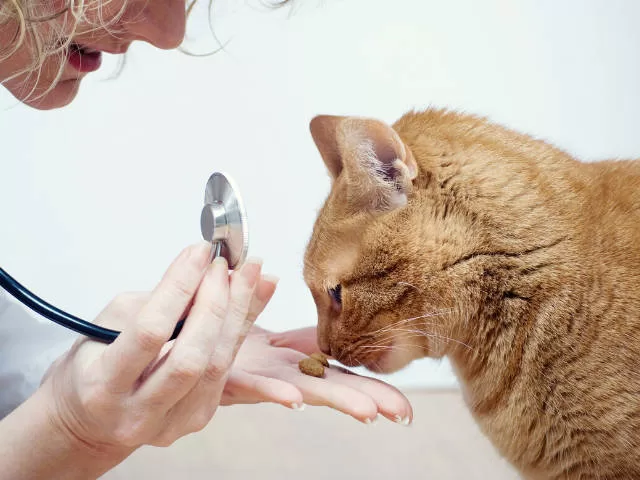
Vaccination Plan for Kittens
Start of Vaccination in Puppies
The arrival of a new cat is always an exciting time, but along with the fun and games comes great responsibility. One of the first things you should consider is when to start your puppy’s vaccination plan. Typically, veterinarians recommend starting kittens vaccinated between 6 to 8 weeks of age.
- First dose: 6 to 8 weeks
- Second dose: 10 to 12 weeks
- Third dose: 14 to 16 weeks
Frequency of Necessary Doses and Reinforcements
Vaccination schedules can vary depending on the type of vaccine used, but generally follow a similar pattern:
- First dose at two months.
- Second dose after four weeks.
- Third dose after another four weeks.
After the initial cycle, the cat should receive annual boosters to ensure its continued immunity to disease.
Special Considerations for Kittens in Fragile Health
Fragile cats or cats with health issues may need to follow a different schedule. It is important to consult your veterinarian before making any decisions about vaccinating your pet. They will be able to provide guidance based on your cat’s specific medical history and help you come up with the best possible plan.
For example, if your cat has an underlying immune condition, he may not respond to the vaccine in the same way that a healthy cat would. In that case, the veterinarian may recommend additional doses or different types of vaccines.
In summary, every cat is unique and their individual needs must be taken into account when planning their immunization routine. Always keep this in mind as you prepare to bring your new feline friend home!
Pre-Vaccination Preparation and Side Effects
Preparing your cat for vaccination
Preparing your cat for vaccination is a crucial step. It’s not as complicated as it sounds, but it requires attention. Here are some tips:
- Make sure your cat is healthy before vaccination.
- Keep him hydrated and well fed.
- Avoid unnecessary stress before the procedure.
Remember, rhinotracheitis is one of the diseases that this vaccine can prevent. It is caused by a virus and can lead to severe breathing problems in cats.
Possible side effects of vaccination
Like any other medical intervention, vaccination can have some side effects. Some of the most common ones include:
- loss of appetite
- mild fever
- Swelling at the injection site
- Lethargy
These are usually temporary and should go away within 24-48 hours of getting the vaccine.
When to Seek Veterinary Help After Vaccination
Despite the obvious benefits of vaccination, sometimes things can go wrong. If your cat exhibits any of these symptoms, seek veterinary help immediately:
- Vomiting or persistent diarrhea
- difficulty breathing
- Aggressive or unusual behavior
The cause of these symptoms could be an adverse reaction to the vaccine or an indication that the animal was already suffering from an underlying illness before the vaccine was administered.
So always remember: proper pre-vaccination preparation and close post-vaccination observation are essential to ensure your feline friend stays healthy!
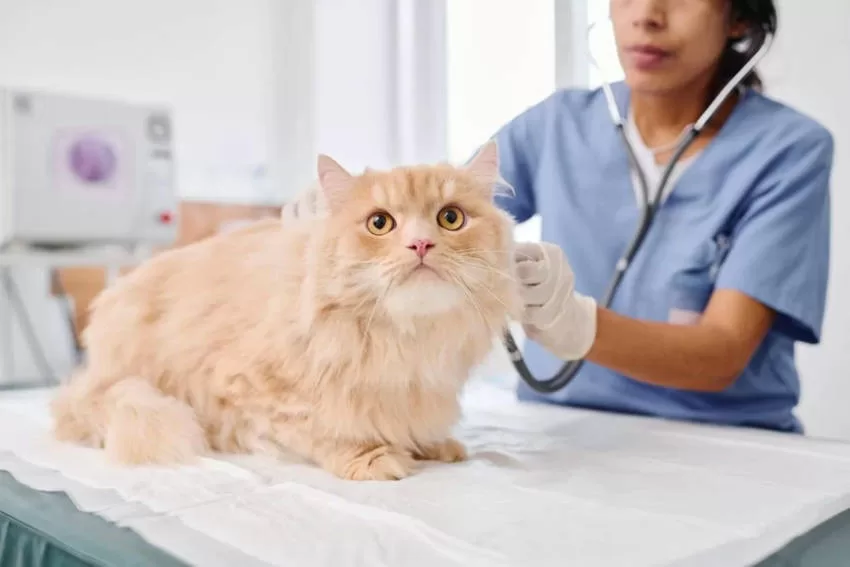
Optional Vaccines: Protection and Timing
Optional vaccines for cats
Optional cat vaccinations may vary depending on geographic location, cat lifestyle and exposure to other animals. Some of these vaccines include:
- The vaccine against feline leukemia virus (FeLV), which protects against a virus transmitted through direct contact, mainly through bites.
- The vaccine against feline viral rhinotracheitis, calicivirus and panleukopenia, also known as feline triple.
- The vaccine against Chlamydia psittaci, a bacteria that can cause pneumonia in cats.
Benefits of Additional Vaccines
Giving these additional vaccines can have several health benefits for our feline friends. In addition to protecting against specific diseases, they also contribute to the overall health of the animal.
For example:
- Vacunes can prevent serious and even fatal illnesses in some cases.
- They also help control the spread of disease among animals.
When to administer these vaccines?
The right time to administer these vaccines varies depending on your cat’s age, general health and risk of exposure to the virus or bacteria in question.
However, here is a basic schedule you can follow:
- First dose of feline triple: 8 weeks
- Second dose: 12 weeks
- Third dose: 16 weeks
- First dose of FeLV (for cats at risk): 8 weeks
- Second dose: 12 weeks
Always remember to consult your veterinarian before making any decisions about your pet’s vaccines.
As an owner responsible for your pet’s well-being, it’s important to be aware of the options available to you when it comes to protecting your pet’s health. Understanding the different vaccine options, their potential benefits, and when they should be given can ensure you’re doing everything you can to keep your furry friend safe and healthy.
Ideal Age to Vaccinate Cats
Your cat’s age can have a significant impact on the vaccination plan. It’s not just a question of "how old is the cat" , but also which vaccines are appropriate for its age and general health.
The influence of age on vaccination
Newborn kittens receive antibodies through their mother’s milk, which provide early protection against disease. However, this immunity begins to wane after the first few weeks of life. That’s why veterinarians generally recommend starting the first shots of vaccines between six and eight weeks of age.
Vaccines are given in multiple doses to ensure the cat’s immune system has enough time to develop an adequate response. Subsequent doses are normally given at three to four week intervals until the cat is about 16 weeks old.
When to Revaccinate Senior Cats
But what about our older feline friends? Many people wonder if they should continue to revaccinate their senior cats. The answer depends on the overall health of the animal and the potential risks to which it is exposed.
Senior cats with compromised immune systems may not be able to handle certain vaccines. In these cases, a veterinarian may recommend an alternative plan or choose to omit some vaccines altogether.
On the other hand, if your cat spends a lot of time outdoors and is in constant contact with other animals, it may be necessary to maintain a regular vaccination regimen even in old age.
In any case, it’s always best to consult a professional before making any decisions about your pet’s health. They will be able to properly assess your cat’s general condition and determine what is the best course of action when it comes to routine vaccinations.
Remember: every cat is unique! What works for one may not work for another. Therefore, it is crucial to understand your feline friend’s individual needs when it comes to the ideal age for vaccination.
Details of the Vaccination Plan for Adult Cats
Differences in the Immunization Schedule
Immunization of adult cats differs greatly from that of kittens. Puppies usually begin receiving vaccines when they are around 6 to 8 weeks old, and shots are given at regular intervals until they are 16 weeks old. Adult cats, who have already completed their initial series of vaccines, usually only need annual boosters.
- Puppies: Start of vaccines at 6-8 weeks, with regular doses up to 16 weeks.
- Adults: Annual boosters after the initial series of vaccines.
Customized Schedule
However, not all adult cats follow this standard schedule. Some factors may require a custom schedule:
- General Health: Cats with chronic health issues may need an adjusted schedule.
- Lifestyle: Outdoor cats may need additional protection against specific diseases.
- Medical History: If your cat’s medical history is unknown or if he has not been regularly vaccinated in the past, a different schedule may be required.
Always consult the veterinarian to create the best plan for your pet.
The Importance of Annual Reinforcements
Annual boosters are essential to maintain your cat’s immunity against many dangerous diseases. Think of it as a boost to your pet’s protective shield – without it, they could be vulnerable.
For example:
- The annual booster of the FVRCP vaccine protects against feline viral rhinotracheitis, calicivirus and panleukopenia.
- Boosting FeLV helps prevent feline leukemia, a serious disease that affects the immune system of cats.
While it’s tempting to skip these boosters in favor of economy or convenience, doing so puts your pet’s health at risk. Always remember this: preventing is easier (and often cheaper) than treating!
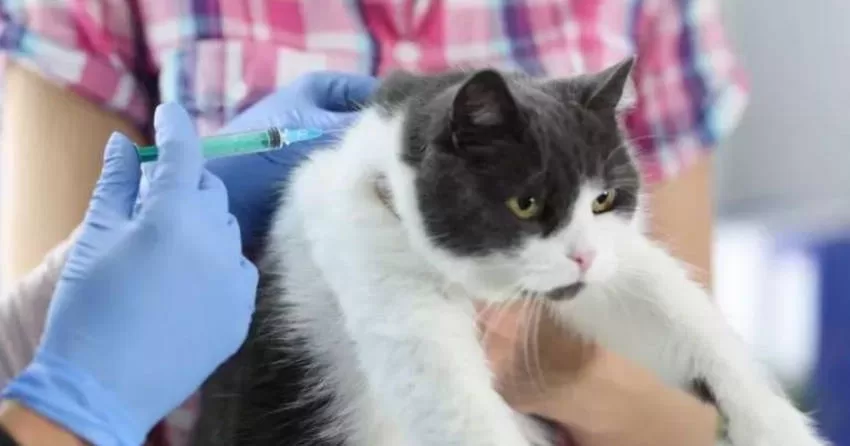
Conclusion: The Importance of Cat Vaccination
Vaccinating your cat is essential to maintain its health and well-being. The first and second dose of Triple Feline are essential to protect your cat against various diseases. Planning vaccination since he’s a kitten can make all the difference in his adult life.
Remember, preparing your pet for vaccination and being aware of possible side effects is just as important as the vaccines themselves. There are also optional vaccines that can offer additional protection depending on your cat’s lifestyle.
The ideal age to start vaccinating cats varies, but generally starts when they are between six and eight weeks old. And don’t forget, even adult cats need to follow a regular vaccination plan.
So, don’t hesitate! Protect your feline friend today with a proper vaccination plan.
Common questions
What are the main vaccines that my cat needs?
The main ones include feline triple, rabies and feline leukemia.
When should I start vaccinating my kitten?
The ideal is to start around six to eight weeks of age.
Are there side effects of vaccines in cats?
Yes, some possible ones include mild fever, loss of appetite or swelling at the injection site.
Does my adult cat still need to be vaccinated?
Yes! It is important to maintain a regular immunization schedule throughout your pet’s life.
Are vaccines safe for all cats?
In most cases yes, but always consult a veterinarian first.
External References:
Veterinary Oral Health Council
American Veterinary Medical Association
Pet Hair Removal Brush Dogs And Cats See product

